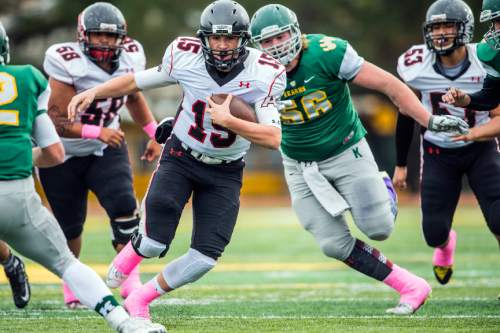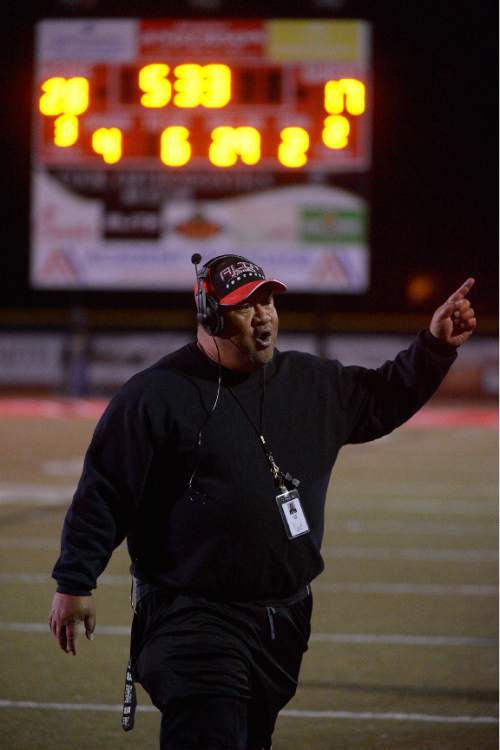This is an archived article that was published on sltrib.com in 2016, and information in the article may be outdated. It is provided only for personal research purposes and may not be reprinted.
College football recruiting services are a booming industry, with companies charging fluctuating prices exceeding $1,000, while similarly flourishing satellite camps cost hundreds of dollars in addition to travel expenses.
For high school football players and their families hoping to land a college scholarship, are these companies worth the financial investment?
Some who have used the services say they are, citing positive experiences that resulted in scholarship offers. Yet, many coaches claim they aren't and recommend families avoid the companies.
"I feel bad for some of these families where the kids really want scholarships, but nobody is being legitimately honest with the player about his ability to play at the next level," said Roy defensive coordinator Eric Jones.
Recruiting services beg to differ. Joy Schwartz of Reigning Champs — parent company for the recruiting service NCSA — said her company communicates with clients to locate the environment best suited for athletics, academics and socially. Schwartz said NCSA helped more than 20,000 athletes commit "to play their sport" in 2015, offering various tools ranging from free to $2,400.
"Recruiting services help student athletes find and develop their best path to college," she said. "From our perspective, what we would do, is look holistically at an athlete and help them find the best opportunities for them to go play their sport and succeed in college."
When asked how many NCSA clients didn't receive scholarships, Schwartz said she did not have an exact number. They don't track those statistics, she added, because "oftentimes kids decide [they] don't want to play a sport in college" in the midst of the process.
Less than 3 percent of the 1,083,617 prep football players nationwide earn Division I scholarships, according to the NCAA. Less than 7 percent of those players will play at any level in college. The transition from the high school to college game is ripe for misunderstanding and miscommunication, which is why many coaches are against parents or players hiring companies to guide them through the recruiting process.
Buyer beware?
"Do not pay for any recruiting service," Penn State coach James Franklin said recently when he addressed the Sound Mind Sound Body Football Academy. "The only recruiting services I've ever used at any place I've ever been are the ones that we pay for. Do we get [tapes from recruiting services]? Yeah, but they go right in the trash."
Arkansas coach Bret Bielema, who spoke at the same event alongside Franklin and Eastern Michigan coach Chris Creighton, added "even as an assistant, I've never used any service that has been sent to me. I've only used the ones I've bought, and I still don't use those a lot. We do it by word of mouth; we do it by Hudl [a website that specializes in scouting video]; we come out and recruit certain areas."
Schwartz of Reigning Champs says she respects the coaches' opinion, but noted "well over 40,000 coaches use our service on a regular basis at every level at every position across every sport. I feel very confident in saying while that's a great thing to say in a room full of parents, we've got a lot of proof and a lot of relationships that would show otherwise."
Hudl is a service used by more than 114,000 teams and 3.5 million players, according to its website, and is often offered by high schools to their athletes free of charge. It's another avenue in addition to the various social media options for athletes to generate exposure without dipping into their savings account.
"People think there is this series of steps you've got to jump through," said Alta coach Alema Te'o. "Absolutely not, man. Performance. Transcripts. That's it. Performance is going to get you noticed, transcripts are going to get you signed."
Brian Kerr, whose son, Braxton, played quarterback at Alta last year and is now at Snow College, hired NCSA for $1,500 before Te'o assumed his position with the Hawks. Kerr claimed he and the Alta staff essentially did all the work and NCSA cashed the paycheck.
"It wasn't what I thought it was going to be. [NCSA] provide[s] you an assessment of your talent, then they give you all the resources to contact schools, and that's about it," Kerr said. "You don't need the recruiting service if your high school coaches are good ambassadors for the kids. We were already stuck into the NCSA deal, so we kind of used both of them, but all of our stuff came through Alema."
Both Te'o and Jones said recruiting services ultimately deliver opportunities to athletes, but frequently it will be with a smaller program that doesn't offer athletic scholarships, forcing families to pay the majority of tuition "in the middle of nowhere" on an academic grant.
Schwartz said NCSA clients are placed from every level ranging from Division I to junior college. "We're really pretty equally distributed across," she said.
For Summit Academy long snapper Jesse Hooper, the opportunities from NCSA have been "monumental." The junior said he's yet to speak with a Division I coach, but he's been in contact with "easily over 10 schools" in Division III after hiring NCSA.
"Maybe it's not good for the big Division I schools, like Alabama, but that's not where 90 percent of the high school players go to," Hooper said.
Satellite camp cautions
Another trend in the recruiting sphere — despite scrutiny from the NCAA — is satellite camps, which are designed for athletes to showcase abilities with multiple college coaches in attendance. The main skepticism is the belief that the players receiving scholarship offers would gain the attention regardless of their participation, while the camps profit from players who attend, but aren't really recruitable athletes.
"I just feel bad watching family after family throw money at these camps, trying to get their kids a scholarship. Nobody is giving them an honest opinion ahead of time," Jones said. … "If the kids want to go for skill development purposes — that's fine. I've got no problem if they're just going to learn football, [but] I think a lot of these kids and families are hanging their hopes on the fact they're going to get noticed."
Te'o founded the All-Poly camp more than 15 years ago, long before the camps' recent boom in popularity. He has witnessed the dangers of camps offering promises they can't deliver on. Te'o said it's the responsibility of the camp to be honest to help parents "face the facts that maybe my son is not good enough to be a college athlete."
Te'o also encourages parents to research camps to avoid shady scenarios, specifically cautioning against attending any camp allowing "street agents" to represent players.
"Anybody who is telling you, if you come over here, I'm going to be able to [do] this — that is absolutely a bunch of bullcrap," he said. "Those kind of guys need to be locked up. There has got to be legitimate research [from parents and players] because there are a lot of guys doing stuff they shouldn't really be doing. We have to be upfront and honest that just because you show up here doesn't mean you're going to get this offer."
Playing football in college is an aspiration shared by hundreds of thousands of high school athletes nationwide, and both Te'o and Jones said they never want to extinguish those ambitions. But they do want to protect families from making financial mistakes out of desperation.
Both coaches advise parents and players to engage in realistic conversations with their high school coach and to create their own highlights using software provided by the high school because players are their own best recruiters.
"I can guarantee we're all watching film," Eastern Michigan's Creighton said. "A lot of people will give you different advice, [but] play football, be great teammates, and you're going to have film. That's what matters."
Twitter: @trevorphibbs





